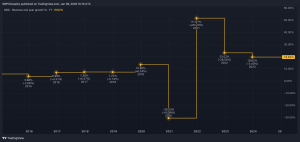Over the past decade, not many shares have increased in value by 1,000%. One that has come close is the parent company of Google, Alphabet (NASDAQ: GOOG). Its shares are 800% higher than they were 10 years ago. That means the per share price is now in the thousands of dollars. To combat that, Alphabet has announced plans to split the shares. Does it make sense for me to buy Alphabet shares now for my portfolio, or ought I to wait until after the share split is complete?
What is a share split?
Imagine that I had a healthy shrub I liked in my garden. Over the course of some years, it gets so big that it becomes hard for me to manage. Instead, I split it into a number of smaller shrubs, which I can move to different places more easily.
5 Stocks For Trying To Build Wealth After 50
Markets around the world are reeling from the coronavirus pandemic… and with so many great companies trading at what look to be ‘discount-bin’ prices, now could be the time for savvy investors to snap up some potential bargains.
But whether you’re a newbie investor or a seasoned pro, deciding which stocks to add to your shopping list can be a daunting prospect during such unprecedented times.
Fortunately, The Motley Fool UK analyst team have short-listed five companies that they believe STILL boast significant long-term growth prospects despite the global upheaval…
We’re sharing the names in a special FREE investing report that you can download today. And if you’re 50 or over, we believe these stocks could be a great fit for any well-diversified portfolio.
That is the thinking behind share splits. When a share reaches a high price, it makes it harder for an investor to buy it because the cash outlay is so high. Splitting the share into 20 new shares, which is what Alphabet plans to do, means that each new share is much less valuable individually, making it more affordable. As a shareholder, although I would own more shares, my percentage stake in the company stays the same.
Alphabet share split
In Alphabet’s case, the split could also make the shares eligible to be included in the Dow Jones index, which they are not at the moment. That could increase demand from tracker funds, possibly boosting the share price.
There is some academic evidence that share splits can increase the marketability of a company’s shares. But that will not necessarily happen. After all, the company remains the same and my percentage stake in it as a shareholder would be unchanged, even if I end up owning more shares after the split. There are also some inconveniences to a shareholder following a split, such as trying to calculate capital gains. But in general, a share split should not negatively affect the overall value of my holding in a company.
Alphabet has been performing strongly. Indeed, that is probably why it plans a share split. The share price is up 30% in the past year alone. The company’s revenue grew 41% last year and earnings per share growth was 93%. Properties such as YouTube should help the company continue to post strong growth, in my view.
I would buy Alphabet shares
There are risks. Such high growth rates are hard to maintain. The costs of developing new revenue streams could eat into profits. Alphabet’s size means regulators could seek to take a chunk out of profits, by fining it or indeed pushing to break it up.
But I think this is a top class company and would be happy to buy its shares for my portfolio. A share split makes no difference to my view of the company’s prospects. I see no compelling reason to wait until after the split to make my move. I would consider buying Alphabet shares today.
Christopher Ruane has no position in any of the shares mentioned. Suzanne Frey, an executive at Alphabet, is a member of The Motley Fool’s board of directors. The Motley Fool UK has recommended Alphabet (A shares) and Alphabet (C shares). Views expressed on the companies mentioned in this article are those of the writer and therefore may differ from the official recommendations we make in our subscription services such as Share Advisor, Hidden Winners and Pro. Here at The Motley Fool we believe that considering a diverse range of insights makes us better investors.
This post was originally published on Motley Fool







